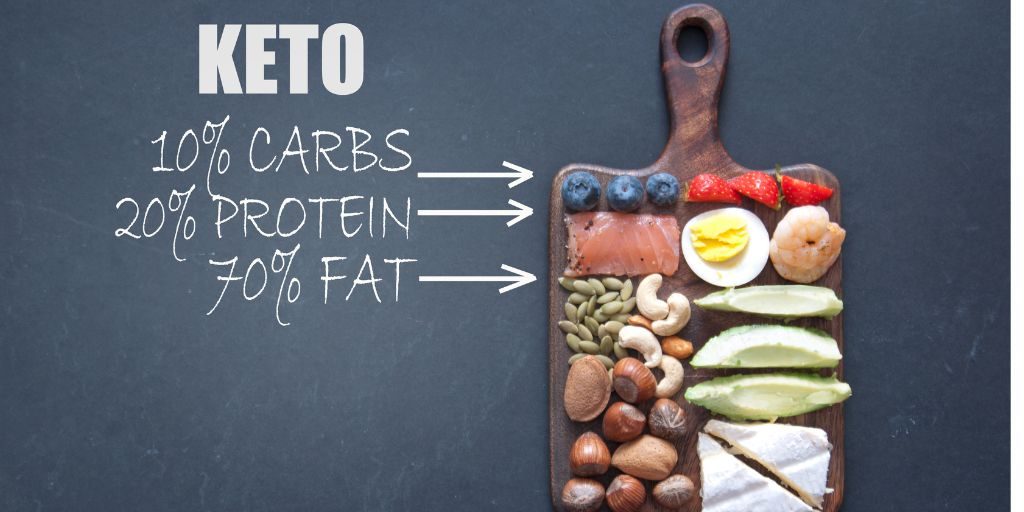The ketogenic diet has gained popularity in the quest for a healthy lifestyle as a practical dietary approach to weight loss and improved metabolic health. This dietary regimen is based on drastically reducing carbohydrate intake and increasing the proportion of healthy fats, which brings the body into a metabolic state known as ketosis. Below, we will explore the ketogenic diet’s origin, concept, characteristics, and benefits in transforming your body and energy.
Origin of the ketogenic diet

The ketogenic diet has its roots in the medical treatment of epilepsy. It was developed in the 1920s as a therapeutic alternative for the management of seizures in patients with epilepsy, especially those who did not respond to conventional treatments.
The physicians observed that restricting carbohydrates and increasing fat intake led to the production of ketone bodies in the body, which in turn appeared to reduce the frequency and severity of seizures in some patients. This discovery laid the groundwork for the development of the ketogenic diet as a therapeutic approach for treatment-resistant epilepsy.
Over the years, the ketogenic diet has evolved and gained popularity beyond its initial application in the treatment of epilepsy. It has become a dietary approach used for weight loss, improving metabolic health, and supporting brain health in various contexts.
What is the ketogenic diet?

The ketogenic or keto diet is characterized by being low in carbohydrates, moderate in protein, and high in healthy fats. By restricting carbohydrate intake, the body switches its primary energy source from glucose to ketone bodies, produced from fat. This can help burn fat more efficiently, which in turn can lead to weight loss.
Foods allowed on the ketogenic diet
The ketogenic diet allows foods such as lean meats, fish, eggs, avocados, nuts, seeds, olive oil, and other healthy oils. Carbohydrate-rich foods such as bread, rice, pasta, refined sugars, and most fruits are avoided. Maintaining a proper balance between macronutrients is essential, with about 70-75% of calories coming from fat, 20-25% from protein and 5-10% from carbohydrates.
Benefits of ketogenic diet to transform your body and energy

The ketogenic diet has demonstrated significant benefits for transforming your body and energy. Some of the key benefits include:
- Weight loss: Ketosis, a metabolic state induced by the ketogenic diet, can promote the burning of fat as a primary source of energy, which can contribute to weight loss.
- Blood sugar control: It has been observed that the ketogenic diet can help stabilize blood sugar levels, which is beneficial for people with type 2 diabetes.
- Improved cholesterol and triglyceride levels: Some research suggests that the ketogenic diet may positively impact blood cholesterol and triglyceride levels.
- Reduced inflammation: It has been studied that the ketogenic diet may have anti-inflammatory effects, which may benefit overall health.
- Brain health support: Potential benefits of the ketogenic diet have been observed in neurological disorders such as epilepsy and Alzheimer’s disease, suggesting a positive impact on brain health.
These benefits highlight the transformative potential of the ketogenic diet in terms of weight loss, metabolic health, and sustained energy.
Myths of the ketogenic diet

- Permanent weight loss: A common myth is that the ketogenic diet guarantees permanent weight loss. While it may lead to initial weight loss due to carbohydrate restriction, maintaining a healthy weight over the long term requires a comprehensive approach that includes sustainable eating habits and regular exercise.
- No limit on fat intake: There is a mistaken belief that an unlimited amount of healthy fats can be consumed on the ketogenic diet. However, it is essential to maintain a balance and not overindulge in fat consumption, as excess calories from fat can hinder weight loss goals.
- Some people assume that all carbs are bad on the ketogenic diet, but the reality is that high-fiber, nutrient-dense carbohydrate sources, such as non-starchy vegetables, should be carefully selected to maintain nutritional balance.
- It’s the solution for everyone: Another myth is that the ketogenic diet is the solution for all people and all health conditions. In reality, each person is unique, and what works for one person may not be suitable for another. In addition, some health conditions may contraindicate following this diet.
- Unlimited increase in protein intake: Some people believe that on the ketogenic diet protein can be consumed in unlimited amounts. However, excessive protein intake can be converted to glucose through gluconeogenesis, which can interfere with ketosis.
Contraindications of the ketogenic diet

Despite its potential benefits, the ketogenic diet is not suitable for everyone. Those with liver disease, gallbladder disorders, pancreatitis, nutritional deficiencies, pregnant or lactating women, and people with eating disorders should avoid this type of diet. In addition, it is crucial to seek medical guidance before starting it, especially for those with pre-existing health conditions.
In conclusion, the ketogenic diet offers a variety of significant benefits for transforming your body and energy. The benefits of the ketogenic diet, including weight loss, blood sugar control, improved cholesterol and triglyceride levels, reduced inflammation, and support for brain health, highlight its ability to transform the body and provide sustained energy. For best results, we invite you to accompany this style of diet with our QUEMAGRASASAS.


